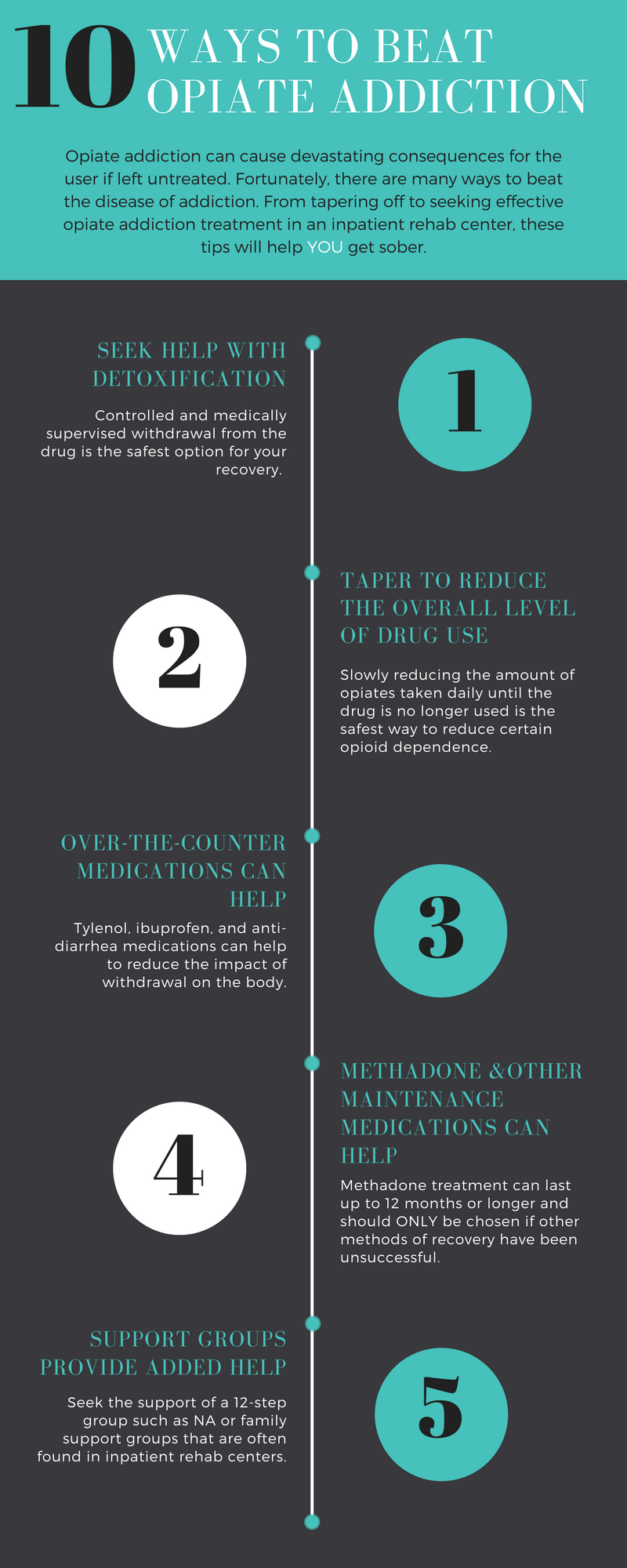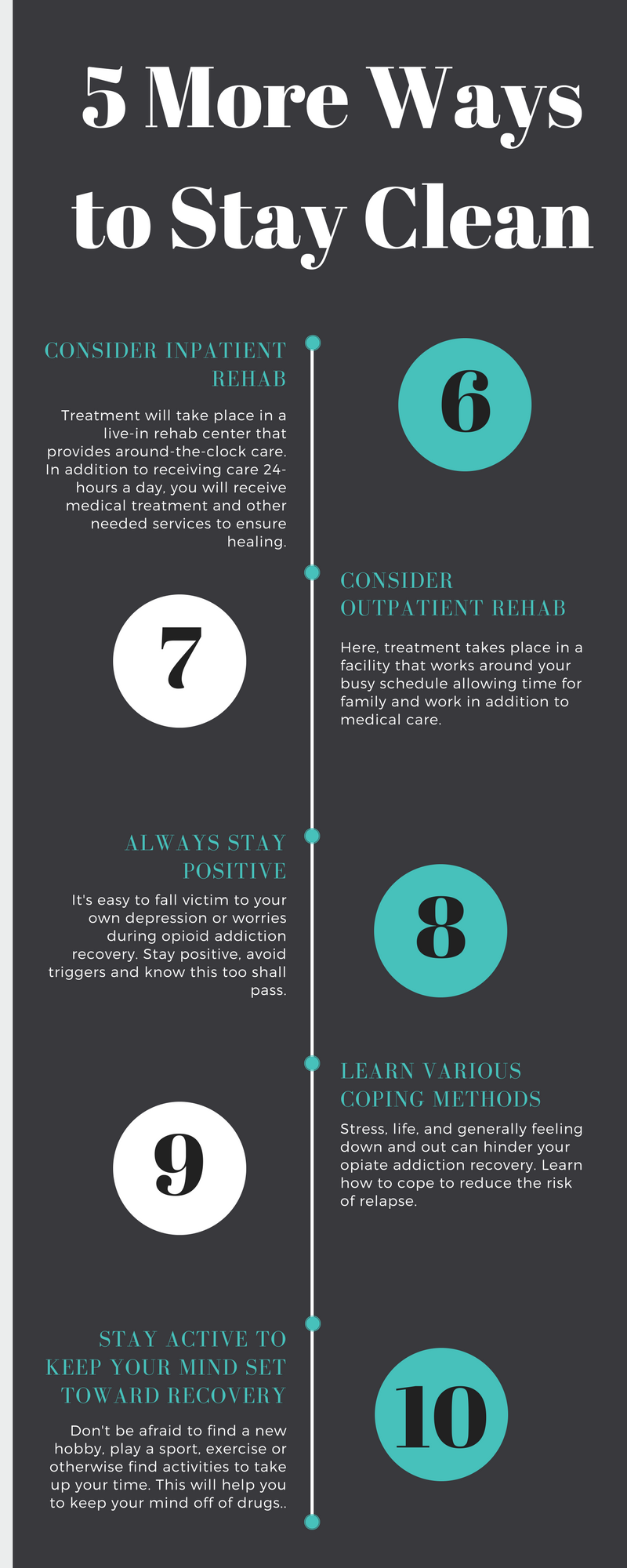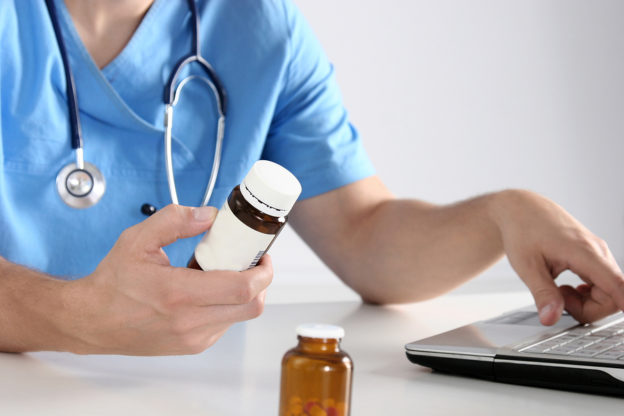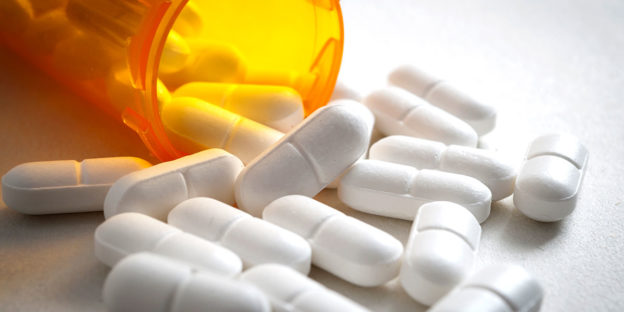Opiate addiction can be tough to beat. Emotionally you may feel overwhelmed, drained or otherwise unable to kick the habit alone. Physically you feel awful and as if the only possible way to feel better is by taking one more pill or using one more dose of heroin. No matter what your chosen opioid is, these tips will help you kick the habit and come out free from the addiction that’s currently in control of your life.
For help finding an inpatient rehab center that will guide you through the healing process, call 1-888-605-7779 today.

The first 5 tips to help you get clean are:
- Seek Help with Detox
- Slowly Taper to Reduce Withdrawal Impact
- Use Over-the-Counter Medications as Needed
- Consider Methadone or other Maintenance Medications
- Seek the Help of a Support Group
Seek Help with Detox
The assistance of a controlled medical detox facility in inpatient rehab can help you to SAFELY overcome opioid withdrawal. According to WebMD, you will likely need some help overcoming withdrawal symptoms such as:
- cravings
- nausea
- chills
- vomiting
- diarrhea
Medical detox will not only provide you with the support you need, but also the around-the-clock care necessary to ensure your safety during withdrawal. This is especially important if you are addicted to methadone or if you have been using high doses of opiates for a very long time. As your body adjusts to life without the narcotics you may suffer from serious complications in the early days of withdrawal. Symptoms may include lowered heart rate or other complications.
Slowly Taper to Reduce Withdrawal Impact
Daily reduction in the overall amount of the drug that you are taking can help you to reduce the impact of withdrawal on your body–but this is ONLY if you are able to taper the drug without continued use in excess of what a tapering schedule recommends. Most addicts are unable to effectively taper medication without the help of a doctor or other healthcare professional. However, when under the guidance of a medical practitioner in an inpatient rehab center, you can slowly taper the drug off reducing the impact of withdrawal as the body adjusts to the small change in the dose being taken over time.
Use Over-the-Counter Medications as Needed
Whether you are withdrawing in a residential detox program or on your own at home, over-the-counter medications such as tylenol, ibuprofen, and anti-diarrhea medications can help to reduce symptoms. If you’re in a residential rehab center or detox setting, you may also be given prescription medications to help ease symptoms of opiate withdrawal. These medications may include librium, ativan, valium, or other forms of anti-anxiety or anti-seizure medications to reduce the stress you feel during this challenging time.
Consider Methadone or other Maintenance Medications
Methadone is a widely accepted opioid replacement therapy that has been used to reduce cravings and minimize withdrawal symptoms for many years but it’s not for everyone. Before you even consider methadone or other maintenance medications such as buprenorphine or naloxone or Suboxone you MUST seek the help of a medical provider. Failure to seek medical treatment may lead to serious complications and can reduce the overall effectiveness of these medication maintenance programs. Individuals who take methadone or other maintenance drugs for opioid recovery generally find themselves on a 12-month or longer recovery plan that includes slowly tapering the medications off to reduce withdrawal impact.
Seek the Help of a Support Group
Many different types of support groups exist to help those who are addicted to opiates and other drugs or alcohol. The most common support group is Narcotics Anonymous (NA). Meetings take place around the world in public settings and are generally open to anyone interested in learning more about the 12-step recovery and healing process. You don’t have to be sober to attend an NA Meeting, but you do have to WANT sobriety and you do have to be willing to listen to others and provide support in this environment. Other forms of support include family support groups and programs that are offered in inpatient rehab centers. For help finding the support you need, call 1-888-605-7779 today.

The additional tips listed to help you remain clean and sober during the early days of opiate addiction recovery include.
6. Consider Residential Rehab or Inpatient Rehab
7. Don’t Be Afraid to Seek Outpatient Rehab
8. Remain Positive Despite the Worry
9. Learn How to Cope without Drugs
10. Stay Active and Involved in Your Recovery
Consider Residential or Inpatient Rehab
During residential rehab you are given around-the-clock care in a supportive environment where the only thing that matters is your recovery. Medications are provided to ensure your safety. 24-hour care is provided and you will receive counseling, therapy, and support as needed. ONLY inpatient rehab can provide you with the treatment support you need around-the-clock. While it may seem scary at first to think about leaving your family and friends behind, living in a residential rehab center for 30, 60 or 90-days can change your life. If you’re ready to get sober, call 1-888-605-7779 and we’ll help you find a local rehab center that can help.
Don’t Be Afraid to Seek Outpatient Rehab
If you attend an inpatient rehab program, your next step will be outpatient care. If you choose not to go into residential treatment, you likely still need counseling and support in order to get sober and to stay sober. Treatment in an outpatient rehab center offers flexibility that works around your busy schedule allowing you to remain actively involved in your family, work or school while also receiving medically assisted treatment for opiate addiction. Counseling and support are provided during normal business hours allowing you to get the help you need in a slightly less invasive environment.
Remain Positive Despite the Worry
It’s easy to fall victim to your own worry–especially when you’re trying so hard to overcome opiate addiction. The best advice you can be given is to remain positive. Seek ways to avoid triggers. Find opportunities for positive change. Don’t be afraid to set meaningful goals that will help you to achieve your dreams–staying sober is all about staying positive in recovery. Always do your best to have an “I can do this” attitude and you’ll find each day comes a little bit easier than the last.
Learn How to Cope without Drugs
Emotionally, opiate addiction takes over your feelings and you get a sense that you can no longer “feel good” or “feel ok” without drugs. Learning how to cope with triggers, stress, or emotional upset can be one of the most challenging elements of recovery. Stress relief activities such as exercise can help as can spending time with a pet or loved one when you’re feeling like you want to use. Relapse becomes a dangerous side effect of recovery as you inch your way into the future of sobriety. Learning how to cope with life in recovery without returning to the use of opiates such as heroin or prescription painkillers ensures that you remain on the right side and that you do not fall victim to relapse.
Stay Active in Recovery
Staying active means not only taking part in an exercise program or hobby to pass the time but also to remain active in your recovery efforts. Don’t let your guard down and don’t allow yourself to feel as if you can just let your feelings go. Seek support, stay involved in your counseling and therapy sessions, and do anything you can to beat cravings besides allowing yourself to slip back into your previous habits of drug use. If you do relapse, seek immediate counseling and support to help you get back on track–call our helpline at 1-888-605-7779 today to find a rehab center that can further help you to achieve your recovery goals.





